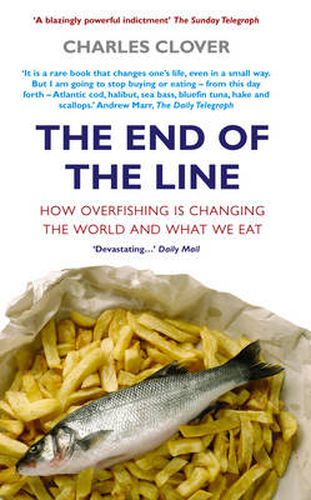Readings Newsletter
Become a Readings Member to make your shopping experience even easier.
Sign in or sign up for free!
You’re not far away from qualifying for FREE standard shipping within Australia
You’ve qualified for FREE standard shipping within Australia
The cart is loading…






We have reached a pivotal moment for fishing, with seventy-five percent of the world’s fish stocks either fully exploited or overfished. If nothing is done to stop the squandering of fish stocks the life of the oceans will face collapse and millions of people could starve. Fish is the aspirational food for Western society, the healthy, weight-conscious choice, but those who eat and celebrate fish often ignore the fact that the fishing industry, although as technologically advanced as space travel, has an attitude to conservation 10,000 years out of date. Trawling on an industrial scale in the North Sea smashes everything it does not catch, taking 16 lbs of dead marine animals to produce just 1lb of sole. Regulation isn’t working, fishermen must cheat or lose money, dolphins and other wildlife (seabirds, turtles, sharks) are killed unnecessarily and fish stocks are collapsing despite the warnings. Because of the shortage of traditional varieties the market has moved on, competing, sometimes illegally, with local fishermen in the waters off Africa and in the Indian Ocean and plundering the high seas and the ocean depths all the way to Antarctica. The End of the Line looks at the problem and proves that we, as consumers, have to change if the situation is to improve.
$9.00 standard shipping within Australia
FREE standard shipping within Australia for orders over $100.00
Express & International shipping calculated at checkout
We have reached a pivotal moment for fishing, with seventy-five percent of the world’s fish stocks either fully exploited or overfished. If nothing is done to stop the squandering of fish stocks the life of the oceans will face collapse and millions of people could starve. Fish is the aspirational food for Western society, the healthy, weight-conscious choice, but those who eat and celebrate fish often ignore the fact that the fishing industry, although as technologically advanced as space travel, has an attitude to conservation 10,000 years out of date. Trawling on an industrial scale in the North Sea smashes everything it does not catch, taking 16 lbs of dead marine animals to produce just 1lb of sole. Regulation isn’t working, fishermen must cheat or lose money, dolphins and other wildlife (seabirds, turtles, sharks) are killed unnecessarily and fish stocks are collapsing despite the warnings. Because of the shortage of traditional varieties the market has moved on, competing, sometimes illegally, with local fishermen in the waters off Africa and in the Indian Ocean and plundering the high seas and the ocean depths all the way to Antarctica. The End of the Line looks at the problem and proves that we, as consumers, have to change if the situation is to improve.